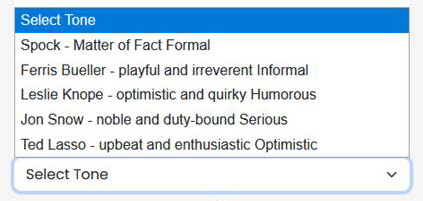How Your Email Tone Impacts Email Marketing Results
by Andrew Lutts
In both email marketing and communications in general, the tone of a message will set the mood and level of interest for the reader.
Is your communication?
- Informative: educational, research-oriented, factual
- Urgent: time sensitive, breaking news, must-know information
- Persuasive: sales-oriented, selling, promotional
- Empathic: compassionate, feeling-oriented, reader-focused
- Funny: humorous, light, lively
Good copywriters can change the tone and voice of their writing easily and effortlessly. But when writing we all tend to migrate back to our own natural style, whatever that may be.
And if you are working with a team of marketers, writers, and content creators, it can be a challenge to develop and maintain a consistent voice and brand that identifies and reinforces the tone of the organization.
Furthermore, certain AI writing tools can do amazing work with writing copy and information, but oftentimes the default tone output is boring, purely informational, and highly predictable.
Matching Tone to Mission
You also need to think about the appropriateness of any kind of tone when address your audience. Are you sending email to a business audience, academic readers, not-for-profit readers, college students, or parents? This will suggest a different tone in each case.
Oftentimes with email marketing, it feels like everyone is trying to sell something. And maybe that's true. But it can be done in many different ways:
Selling insurance? talk about peace of mind for the policyholder and family - a sincere tone
Selling a political ideology? write about how your position is the fairest and most thoughtful - a passionate tone
Selling stock advice? talk about helping investors suucceed, or paint a picture of a happy early reitrement - an encouraging tone
Selling a book? write about the characters, plot, and conflict - a controversial, intriguing or curious tone
Selling religion and spiritual beliefs?
speak to the soul of your readers, to connect - an encouraging uplifting tone
In all these examples, use an appropriate tone to reach and resonate with our audience, and address their needs and desires.
Here are some common workplace and business email tones, and when to use them:
- Professional tone: Use this for clarity, authority, and important information.
- Friendly tone: These kinds of emails are warm, supportive, and builds rapport.
- Appreciative tone: Expressing gratitude in email can be a powerful way to recognize a job well done.
- Encouraging tone: Use this for building consensus, improving morale, and emphasizing the positive.
- Sincere tone: a genuine way to communicate, this personal approach works best for addressing tricky or difficult topics and issues.
- Humorous tone: Not recommended. Even the most carefully-written humorous email can be misinterpreted. And that’s never good.
Results Using Various Tones
It is generally understood that emails written in a conversational, friendly tone have higher open rates compared to more formal language (Source: Campaign Monitor). Open rates are around 50% higher for emails written using conversational tones.
Additionally, emails conveying excitement or urgency in their tone saw conversion rates double compared to neutral emails in A/B tests (Source: Experian). Using words like "Don't miss out!" improved conversions. However, great care must be taken when using sensational language, as readers get weary of promotional emails and often tune them out quickly.
Overly familiar language can feel inappropriate coming from a particular brand. Brand consistency is key. Is the language used appropriate? A conversational, first-name level tone tends to work best for personalization.
MarketingProfs found that the friendlier an email's tone, the more likely recipients are to make a purchase as a result (25% higher boost).
Conversion rates are around 2x higher with email marketing focused on helping the reader and providing useful information perform better.
Promotional emails convert at a higher rate when they build a value narrative first and add calls to action or offers secondarily.
Tone of Voice (TOV) Guidelines
Many companies have Brand guidelines, which dictate approved logos, colors, font choices, and more. Some companies now also use Tone of Voice (TOV) guidelines.
Interestingly, new AI tools can help copywriters and creators develop and use a consistent tone of voice.
For example, the Net Atlantic AI email marketing tool contains a choice of various tones to select from with your message. See image below showing five tone choices:

In fact, in a poll by Bynder https://www.bynder.com 44% of writers say that writing to improve tone is the most time-consuming task they do.
Conclusion
Your tone of voice (TOV) when writing is critical to reaching and communicating with your audience. Whatever tone of voice you or your organization uses, officially or unofficially, it’s best to apply it consistently throughout your communications.Resources
How to Write Conversationally: An (Almost) COMPLETE Guide with 18 Exampleshttps://www.enchantingmarketing.com/conversational-writing/
Review the 18 Types of Tone in Writing
https://peachyessay.com/blogs/types-of-tone-in-writing/
See the Net Atlantic AI Toolset developed exclusively for Email Marketing
https://www.netatlantic.com/emailmarketing/AI-powered-email-marketing
Top 3 AI Tools
Top 3 AI Email Marketing Tools - And How to Use Them
Copyblogger
https://copyblogger.com/
NextMail Email Marketing
https://www.NextMail.email/


